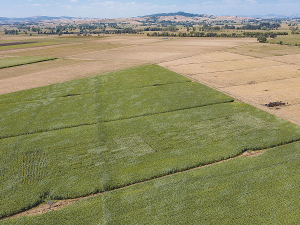Hitting heifer liveweight targets
Early December marks a key transition for many dairy farmers, as weaned replacement heifers head off-farm to grazing.
 It is times like these that the extra stack of silage or the extra paddock of maize silage prove to be very valuable.
It is times like these that the extra stack of silage or the extra paddock of maize silage prove to be very valuable.
Farming is becoming increasingly complex. Until recentyl, farmers had relatively few issues to focus on: feeding cows, producing milk and hopefully making enough money to feed their family and pay off their mortgages.
Things are very different now. The historical issues remain but added to these are increased compliance requirements, regular staff shortages, more demands from milk and meat processors, climate change and of course, global supply chain issues brought about by war and pandemics.
This increased complexity results in increased risk. Until this season, payout has been relatively stable, sitting between $6.12 and $7.54/kgMS.
The biggest business risk has been around the variable climate and trying to produce enough milk to generate good profit.
With the lure of a record payout and the hope of healthy profits, this season has been incredibly frustrating for many farmers.
The excitement of generating big profits due to the record payout has been somewhat dampened by a cold wet spring in some areas, an extended dry period in others and rising input costs across the whole industry.
It is times like these that the extra stack of silage or the extra paddock of maize silage prove to be very valuable. Stored forages like silage and drought tolerant crops like maize are great risk management tools. The advantage of an extra stack of silage is that is available for seasons like this, when it can be used to keep cows in milk and take advantage of a great payout. And if it's not needed, it can be left in the stack for when it is needed. The advantage of growing a paddock of maize silage during these periods of summer dry is that as a drought tolerant, warm loving plant, maize will produce up to three times more dry matter per hectare than pasture.
To save cost even further, consider growing maize silage grown on an effluent paddock. It is unlikely to need any fertiliser, and the maise is extremely good at mopping up excess nitrogen and potash, reducing risk to both animals and the environment. Yields also tend to be higher on effluent paddocks. As a resut, maize silage grown and harvested from effluent paddocks is a cheap source of drymatter, ranging between 13-17c/kgDM depending on the yield. There is no other stored feed on the market that comes anywhere near maize silage at this price.
Ian Williams is a Pioneer forage specialist. Contact him at This email address is being protected from spambots. You need JavaScript enabled to view it.
The Meat Industry Association of New Zealand (MIA) today announced that Chief Executive Officer Sirma Karapeeva has resigned from the role.
The winners of the 2026 Hawke’s Bay/Wairarapa Dairy Industry Awards were announced at the annual awards dinner held at Copthorne Solway Park in Masterton on Thursday evening.
Environment Southland is welcoming this week’s decision by the Environmental Protection Authority (EPA) to approve the release of Blaptea elguetai, a leaf‑feeding beetle that will help control the highly invasive Chilean flame creeper.
This March, the potato industry is proudly celebrating International Women’s Day on 8 March alongside the International Year of the Woman Farmer, recognising the vital role women play across every part of the sector — from paddocks and packhouses to research, leadership, and innovation.
Fruit trader Seeka posted a record profit and returns to shareholders in 2025.
Recent weather events in the Bay of Plenty, Gisborne/Tairawhiti, and Canterbury have been declared a medium-scale adverse event.
OPINION: Staying with politics, with less than nine months to go before the general elections, there’s confusion in the Labour…
OPINION: Winston Peters' tirade against the free trade deal stitched with India may not be all political posturing by the…